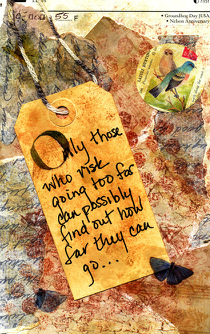
In my attempt to turn the mood around here a bit, I thought I'd write about one of my favorite wellness tools: Journaling. I have to start by saying that my definition of what makes a "journal" is pretty broad - for years I kept a copy paper box full of file folders with inspiring articles, pictures, quotes - and my comments on them. That, for a while, was my "journal." My bottom line in terms what constitutes a "journal" is that it's anything you want it to be. If you call it a "journal," then in my book, it's a journal. Period. There are way too many things in our lives and our worlds that end up being judged - the last thing we need judged is our creative and psychological expressions. Make it whatever you want it to be!
Today, my journals tend to be a little more traditional, but that doesn't mean that I don't branch out on occasion. I usued to keep a "creative journal" which used to be a page-a-day appointment book - I used the pages as something on which to mount my creative expressions. I've been feeling "blocked" creatively for the last couple of months, so there hasn't been anything new to add, but I'm hoping that I'll let loose with a barrage of visual creativity here soon.
I also keep a "regular" journal in one of those cheap composition books that you can buy in the grocery store. This is really my therapeutic journal. When I have trouble thinking straight or am feeling overwhelmed, this is the spot where it all comes out. For me, my creative journal is my "public" journal - if anyone sees it, it's not that big of a deal (after all, I posted pictures of it - how picky can I be?). My "regular" journal is a different story, though. This is the private stuff. When I'm really having a tough time coping, I get this out and write until I can't write anymore. If you're going to do this kind of writing, make sure you feel safe, or that you have some safety to do it. You may want or need to hide, lock up, or keep your journal in a place you feel is safe.
I'm not kidding about that either - once I was so overwhelmed and feeling so down that I wrote for nine straight pages! I've found that there are some incredible books and systems for journaling - my advice would be to do what works for you. That's an important point, because there's a perception that there are a lot of rules to follow, like you should write every day, or write for a certain amount of time or a certain number of pages. It's really important to do what works for YOU. Forget the rules, and forget the shoulds. Let yourself play, too - this can be fun as well as insightful!
I don't put any pressure on myself to write every day, or to write about a certain topic - my journal is MY expression. If you're the kind of person who thinks journaling would help you, I would encourage you to do this - again, do what works for you. Some people have spent lots of money and taken lots of courses on certain systems, like the Progoff system. Others, myself included, buy tons of books on writing and journaling. Other people simply just do it. Some people keep one journal and work through one book at a time. Other people have three or four going at once.
The point here is that this is a tool to help you cope, to help you feel better, and to help you deal with the world around you in a healthy way. It's a tool to help you get to know yourself, and to have a safe place to vent, let off steam, ponder deep thoughts, record your history - whatever you want to make it. This is not the only tool, by far - but it is a very helpful one.
The hard thing is that I see so many people start this, and then quit because they think they are "not doing it right" or read something that makes them feel they are "not good enough." Frankly, as a journal-ist AND as a mental health professional, I can honestly tell you that there IS no one, right or true way to do this. Anything you do here IS good enough, because it's an expression of who you are, where you are in your life, and what you're dealing with.
And if it helps you cope and feel better - as well as be a better person, than it is good enough, right enough, and healthy. If it appeals to you, look up journal prompts, or join a site with an ongoing journal support group. One of my projects that I have going is writing an e-book of journal prompts. I'm excited about it, and hope to offer it in time for the new year.
Whatever you do, do what works. It's effective, and it's healthy.
Please Note: The content on this blog is intended for informational purposes only. This is not therapy, and if you wish to work in therapy, please contact your local mental health agency or your physician for a referral.
If you are in crisis or danger, please call 911 for immediate help. Please, again, realize that seeking out help really IS a sign of strength and not a sign of weakness. You don’t have to be alone in facing these things – there are people who care and who will help. Email me at: [email protected]

 RSS Feed
RSS Feed